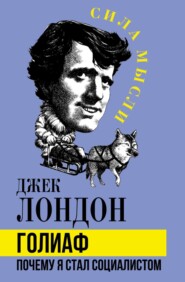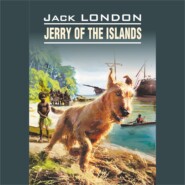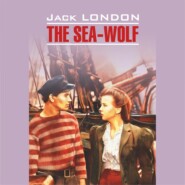По всем вопросам обращайтесь на: info@litportal.ru
(©) 2003-2025.
✖
A Daughter of the Snows
Настройки чтения
Размер шрифта
Высота строк
Поля
"Just so." The lines showed more sharply on Jacob Welse's forehead. "You are working for your own stomach. I am working for the stomachs of twenty thousand."
"But you filled Tim McReady's thousand pounds yesterday all right."
"The scale-down did not go into effect until to-day."
"But why am I the one to get it in the neck hard?"
"Why didn't you come yesterday, and Tim McReady to-day?"
Melton's face went blank, and Jacob Welse answered his own question with shrugging shoulders.
"That's the way it stands, Melton. No favoritism. If you hold me responsible for Tim McReady, I shall hold you responsible for not coming yesterday. Better we both throw it upon Providence. You went through the Forty Mile Famine. You are a white man. A Bonanzo property, or a block of Bonanzo properties, does not entitle you to a pound more than the oldest penniless 'sour-dough' or the newest baby born. Trust me. As long as I have a pound of grub you shall not starve. Stiffen up. Shake hands. Get a smile on your face and make the best of it."
Still savage of spirit, though rapidly toning down, the king shook hands and flung out of the room. Before the door could close on his heels, a loose-jointed Yankee shambled in, thrust a moccasined foot to the side and hooked a chair under him, and sat down.
"Say," he opened up, confidentially, "people's gittin' scairt over the grub proposition, I guess some."
"Hello, Dave. That you?"
"S'pose so. But ez I was saying there'll be a lively stampede fer the Outside soon as the river freezes."
"Think so?"
"Unh huh."
"Then I'm glad to hear it. It's what the country needs. Going to join them?"
"Not in a thousand years." Dave Harney threw his head back with smug complacency. "Freighted my truck up to the mine yesterday. Wa'n't a bit too soon about it, either. But say.. Suthin' happened to the sugar. Had it all on the last sled, an' jest where the trail turns off the Klondike into Bonanzo, what does that sled do but break through the ice! I never seen the beat of it – the last sled of all, an' all the sugar! So I jest thought I'd drop in to-day an' git a hundred pounds or so. White or brown, I ain't pertickler."
Jacob Welse shook his head and smiled, but Harney hitched his chair closer.
"The clerk of yourn said he didn't know, an' ez there wa'n't no call to pester him, I said I'd jest drop round an' see you. I don't care what it's wuth. Make it a hundred even; that'll do me handy.
"Say," he went on easily, noting the decidedly negative poise of the other's head. "I've got a tolerable sweet tooth, I have. Recollect the taffy I made over on Preacher Creek that time? I declare! how time does fly! That was all of six years ago if it's a day. More'n that, surely. Seven, by the Jimcracky! But ez I was sayin', I'd ruther do without my plug of 'Star' than sugar. An' about that sugar? Got my dogs outside. Better go round to the warehouse an' git it, eh? Pretty good idea."
But he saw the "No" shaping on Jacob Welse's lips, and hurried on before it could be uttered.
"Now, I don't want to hog it. Wouldn't do that fer the world. So if yer short, I can put up with seventy-five – " (he studied the other's face), "an' I might do with fifty. I 'preciate your position, an' I ain't low-down critter enough to pester – "
"What's the good of spilling words, Dave? We haven't a pound of sugar to spare – "
"Ez I was sayin', I ain't no hog; an' seein' 's it's you, Welse, I'll make to scrimp along on twenty-five – "
"Not an ounce!"
"Not the least leetle mite? Well, well, don't git het up. We'll jest fergit I ast you fer any, an' I'll drop round some likelier time. So long. Say!" He threw his jaw to one side and seemed to stiffen the muscles of his ear as he listened intently. "That's the Laura's whistle. She's startin' soon. Goin' to see her off? Come along."
Jacob Welse pulled on his bearskin coat and mittens, and they passed through the outer offices into the main store. So large was it, that the tenscore purchasers before the counters made no apparent crowd. Many were serious-faced, and more than one looked darkly at the head of the company as he passed. The clerks were selling everything except grub, and it was grub that was in demand. "Holding it for a rise. Famine prices," a red-whiskered miner sneered. Jacob Welse heard it, but took no notice. He expected to hear it many times and more unpleasantly ere the scare was over.
On the sidewalk he stopped to glance over the public bulletins posted against the side of the building. Dogs lost, found, and for sale occupied some space, but the rest was devoted to notices of sales of outfits. The timid were already growing frightened. Outfits of five hundred pounds were offering at a dollar a pound, without flour; others, with flour, at a dollar and a half. Jacob Welse saw Melton talking with an anxious-faced newcomer, and the satisfaction displayed by the Bonanzo king told that he had succeeded in filling his winter's cache.
"Why don't you smell out the sugar, Dave?" Jacob Welse asked, pointing to the bulletins.
Dave Harney looked his reproach. "Mebbe you think I ain't ben smellin'. I've clean wore my dogs out chasin' round from Klondike City to the Hospital. Can't git yer fingers on it fer love or money."
They walked down the block-long sidewalk, past the warehouse doors and the long teams of waiting huskies curled up in wolfish comfort in the snow. It was for this snow, the first permanent one of the fall, that the miners up-creek had waited to begin their freighting.
"Curious, ain't it?" Dave hazarded suggestively, as they crossed the main street to the river bank. "Mighty curious – me ownin' two five-hundred-foot Eldorado claims an' a fraction, wuth five millions if I'm wuth a cent, an' no sweetenin' fer my coffee or mush! Why, gosh-dang-it! this country kin go to blazes! I'll sell out! I'll quit it cold! I'll – I'll – go back to the States!"
"Oh, no, you won't," Jacob Welse answered. "I've heard you talk before. You put in a year up Stuart River on straight meat, if I haven't forgotten. And you ate salmon-belly and dogs up the Tanana, to say nothing of going through two famines; and you haven't turned your back on the country yet. And you never will. And you'll die here as sure as that's the Laura's spring being hauled aboard. And I look forward confidently to the day when I shall ship you out in a lead-lined box and burden the San Francisco end with the trouble of winding up your estate. You are a fixture, and you know it."
As he talked he constantly acknowledged greetings from the passers-by. Those who knew him were mainly old-timers and he knew them all by name, though there was scarcely a newcomer to whom his face was not familiar.
"I'll jest bet I'll be in Paris in 1900," the Eldorado king protested feebly.
But Jacob Welse did not hear. There was a jangling of gongs as McGregor saluted him from the pilot-house and the Laura slipped out from the bank. The men on the shore filled the air with good-luck farewells and last advice, but the three hundred grubless ones, turning their backs on the golden dream, were moody and dispirited, and made small response. The Laura backed out through a channel cut in the shore-ice, swung about in the current, and with a final blast put on full steam ahead.
The crowd thinned away and went about its business, leaving Jacob Welse the centre of a group of a dozen or so. The talk was of the famine, but it was the talk of men. Even Dave Harney forgot to curse the country for its sugar shortage, and waxed facetious over the newcomers, —chechaquos, he called them, having recourse to the Siwash tongue. In the midst of his remarks his quick eye lighted on a black speck floating down with the mush-ice of the river. "Jest look at that!" he cried. "A Peterborough canoe runnin' the ice!"
Twisting and turning, now paddling, now shoving clear of the floating cakes, the two men in the canoe worked in to the rim-ice, along the edge of which they drifted, waiting for an opening. Opposite the channel cut out by the steamer, they drove their paddles deep and darted into the calm dead water. The waiting group received them with open arms, helping them up the bank and carrying their shell after them.
In its bottom were two leather mail-pouches, a couple of blankets, coffee-pot and frying-pan, and a scant grub-sack. As for the men, so frosted were they, and so numb with the cold, that they could hardly stand. Dave Harney proposed whiskey, and was for haling them away at once; but one delayed long enough to shake stiff hands with Jacob Welse.
"She's coming," he announced. "Passed her boat an hour back. It ought to be round the bend any minute. I've got despatches for you, but I'll see you later. Got to get something into me first." Turning to go with Harney, he stopped suddenly and pointed up stream. "There she is now. Just coming out past the bluff."
"Run along, boys, an' git yer whiskey," Harney admonished him and his mate. "Tell 'm it's on me, double dose, an' jest excuse me not drinkin' with you, fer I'm goin' to stay."
The Klondike was throwing a thick flow of ice, partly mush and partly solid, and swept the boat out towards the middle of the Yukon. They could see the struggle plainly from the bank, – four men standing up and poling a way through the jarring cakes. A Yukon stove aboard was sending up a trailing pillar of blue smoke, and, as the boat drew closer, they could see a woman in the stern working the long steering-sweep. At sight of this there was a snap and sparkle in Jacob Welse's eyes. It was the first omen, and it was good, he thought. She was still a Welse; a struggler and a fighter. The years of her culture had not weakened her. Though tasting of the fruits of the first remove from the soil, she was not afraid of the soil; she could return to it gleefully and naturally.
So he mused till the boat drove in, ice-rimed and battered, against the edge of the rim-ice. The one white man aboard sprang: out, painter in hand, to slow it down and work into the channel. But the rim-ice was formed of the night, and the front of it shelved off with him into the current. The nose of the boat sheered out under the pressure of a heavy cake, so that he came up at the stern. The woman's arm flashed over the side to his collar, and at the same instant, sharp and authoritative, her voice rang out to the Indian oarsmen to back water. Still holding the man's head above water, she threw her body against the sweep and guided the boat stern-foremost into the opening. A few more strokes and it grounded at the foot of the bank. She passed the collar of the chattering man to Dave Harney, who dragged him out and started him off on the trail of the mail-carriers.
Frona stood up, her cheeks glowing from the quick work. Jacob Welse hesitated. Though he stood within reach of the gunwale, a gulf of three years was between. The womanhood of twenty, added unto the girl of seventeen, made a sum more prodigious than he had imagined. He did not know whether to bear-hug the radiant young creature or to take her hand and help her ashore. But there was no apparent hitch, for she leaped beside him and was into his arms. Those above looked away to a man till the two came up the bank hand in hand.
"Gentlemen, my daughter." There was a great pride in his face.
Frona embraced them all with a comrade smile, and each man felt that for an instant her eyes had looked straight into his.
CHAPTER VII
That Vance Corliss wanted to see more of the girl he had divided blankets with, goes with the saying. He had not been wise enough to lug a camera into the country, but none the less, by a yet subtler process, a sun-picture had been recorded somewhere on his cerebral tissues. In the flash of an instant it had been done. A wave message of light and color, a molecular agitation and integration, a certain minute though definite corrugation in a brain recess, – and there it was, a picture complete! The blazing sunlight on the beetling black; a slender gray form, radiant, starting forward to the vision from the marge where light and darkness met; a fresh young morning smile wreathed in a flame of burning gold.
It was a picture he looked at often, and the more he looked the greater was his desire, to see Frona Welse again. This event he anticipated with a thrill, with the exultancy over change which is common of all life. She was something new, a fresh type, a woman unrelated to all women he had met. Out of the fascinating unknown a pair of hazel eyes smiled into his, and a hand, soft of touch and strong of grip, beckoned him. And there was an allurement about it which was as the allurement of sin.
Not that Vance Corliss was anybody's fool, nor that his had been an anchorite's existence; but that his upbringing, rather, had given his life a certain puritanical bent. Awakening intelligence and broader knowledge had weakened the early influence of an austere mother, but had not wholly eradicated it. It was there, deep down, very shadowy, but still a part of him. He could not get away from it. It distorted, ever so slightly, his concepts of things. It gave a squint to his perceptions, and very often, when the sex feminine was concerned, determined his classifications. He prided himself on his largeness when he granted that there were three kinds of women. His mother had only admitted two. But he had outgrown her. It was incontestable that there were three kinds, – the good, the bad, and the partly good and partly bad. That the last usually went bad, he believed firmly. In its very nature such a condition could not be permanent. It was the intermediary stage, marking the passage from high to low, from best to worst.
All of which might have been true, even as he saw it; but with definitions for premises, conclusions cannot fail to be dogmatic. What was good and bad? There it was. That was where his mother whispered with dead lips to him. Nor alone his mother, but divers conventional generations, even back to the sturdy ancestor who first uplifted from the soil and looked down. For Vance Corliss was many times removed from the red earth, and, though he did not know it, there was a clamor within him for a return lest he perish.
Not that he pigeon-holed Frona according to his inherited definitions. He refused to classify her at all. He did not dare. He preferred to pass judgment later, when he had gathered more data. And there was the allurement, the gathering of the data; the great critical point where purity reaches dreamy hands towards pitch and refuses to call it pitch – till defiled. No; Vance Corliss was not a cad. And since purity is merely a relative term, he was not pure. That there was no pitch under his nails was not because he had manicured diligently, but because it had not been his luck to run across any pitch. He was not good because he chose to be, because evil was repellant; but because he had not had opportunity to become evil. But from this, on the other hand, it is not to be argued that he would have gone bad had he had a chance.

















